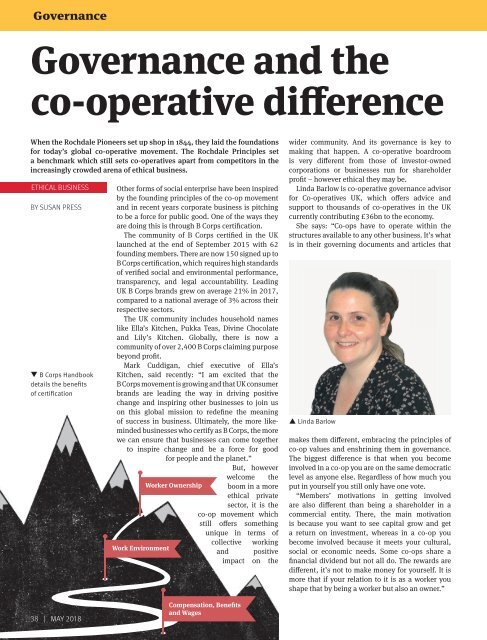MAY 2018
The May 2018 edition of Co-op News: connecting, challenging and championing the global co-operative movement. This issue shines a spotlight on governance – and how co-operatives do it differently. We also look at co-ops on the agenda in Westminster, sustainability supporting and preview some of the motions being put to the vote at the Co-op Group AGM.
The May 2018 edition of Co-op News: connecting, challenging and championing the global co-operative movement. This issue shines a spotlight on governance – and how co-operatives do it differently. We also look at co-ops on the agenda in Westminster, sustainability supporting and preview some of the motions being put to the vote at the Co-op Group AGM.
Create successful ePaper yourself
Turn your PDF publications into a flip-book with our unique Google optimized e-Paper software.
Governance and the<br />
co-operative difference<br />
When the Rochdale Pioneers set up shop in 1844, they laid the foundations<br />
for today’s global co-operative movement. The Rochdale Principles set<br />
a benchmark which still sets co-operatives apart from competitors in the<br />
increasingly crowded arena of ethical business.<br />
ETHICAL BUSINESS Other forms of social enterprise have been inspired<br />
by the founding principles of the co-op movement<br />
BY SUSAN PRESS<br />
and in recent years corporate business is pitching<br />
to be a force for public good. One of the ways they<br />
are doing this is through B Corps certification.<br />
The community of B Corps certified in the UK<br />
launched at the end of September 2015 with 62<br />
founding members. There are now 150 signed up to<br />
B Corps certification, which requires high standards<br />
of verified social and environmental performance,<br />
transparency, and legal accountability. Leading<br />
UK B Corps brands grew on average 21% in 2017,<br />
compared to a national average of 3% across their<br />
respective sectors.<br />
The UK community includes household names<br />
like Ella’s Kitchen, Pukka Teas, Divine Chocolate<br />
and Lily’s Kitchen. Globally, there is now a<br />
community of over 2,400 B Corps claiming purpose<br />
Why this matters: Your company wants to<br />
beyond profit.<br />
attract and retain Mark the Cuddigan, best talent, chief and talented executive of Ella’s<br />
q B Corps Handbook people want Kitchen, to bring said their recently: whole selves “I am to excited that the<br />
details the benefits work every B day. Corps movement is growing and that UK consumer<br />
of certification<br />
brands are leading the way in driving positive<br />
change and inspiring other businesses to join us<br />
on this global mission to redefine the meaning<br />
of success in business. Ultimately, the more likeminded<br />
businesses who certify as B Corps, the more<br />
we can ensure that businesses can come together<br />
to inspire change and be a force for good<br />
for people and the planet.”<br />
But, however<br />
welcome the<br />
Worker Ownership boom in a more<br />
ethical private<br />
sector, it is the<br />
co-op movement which<br />
still offers something<br />
unique in terms of<br />
collective working<br />
Work Environment<br />
and positive<br />
impact on the<br />
wider community. And its governance is key to<br />
making that happen. A co-operative boardroom<br />
is very different from those of investor-owned<br />
corporations or businesses run for shareholder<br />
profit – however ethical they may be.<br />
Linda Barlow is co-operative governance advisor<br />
for Co-operatives UK, which offers advice and<br />
support to thousands of co-operatives in the UK<br />
currently contributing £36bn to the economy.<br />
She says: “Co-ops have to operate within the<br />
structures available to any other business. It’s what<br />
is in their governing documents and articles that<br />
p Linda Barlow<br />
makes them different, embracing the principles of<br />
co-op values and enshrining them in governance.<br />
The biggest difference is that when you become<br />
involved in a co-op you are on the same democratic<br />
level as anyone else. Regardless of how much you<br />
put in yourself you still only have one vote.<br />
“Members’ motivations in getting involved<br />
are also different than being a shareholder in a<br />
commercial entity. There, the main motivation<br />
is because you want to see capital grow and get<br />
a return on investment, whereas in a co-op you<br />
become involved because it meets your cultural,<br />
social or economic needs. Some co-ops share a<br />
financial dividend but not all do. The rewards are<br />
different, it’s not to make money for yourself. It is<br />
more that if your relation to it is as a worker you<br />
shape that by being a worker but also an owner.”<br />
38 | <strong>MAY</strong> <strong>2018</strong><br />
Compensation, Benefits<br />
and Wages


















